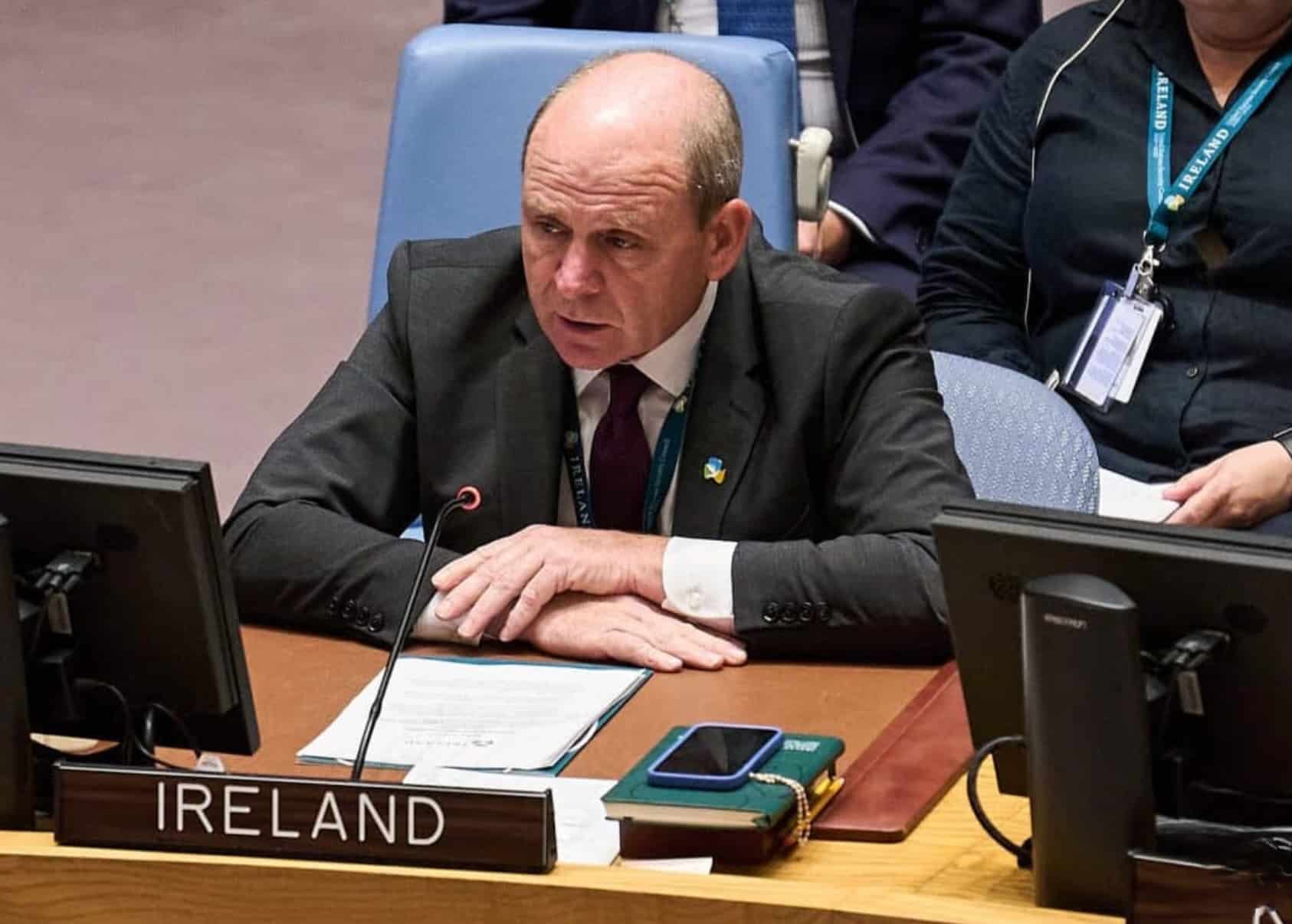Fergal Mythen, Ireland’s envoy to the United Nations, represented his country in the Security Council for the last six months of its two-year term, ending Dec. 31. He concludes his role, explaining that despite the Council’s brittle divisions, it “remains much too soon to write an obituary of the body.” JOHN PENNEY/PASSBLUE
IRELAND’S FERGAL MYTHEN’S STATEMENT: In the summer of 2022, as I prepared to become Ireland’s Ambassador to the United Nations, I watched the Security Council from afar. I questioned if Russia’s aggression against Ukraine might sound a death knell for diplomacy at that top table, already on shaky legs. I have seen the Council up close and personal. I have seen its flaws and that reform is overdue. But as I leave it, my conclusion is that it remains much too soon to write an obituary of the body.
From the outside, I think the Council can seem like an institution defined by traditions, by rules, by procedure. In some ways, it certainly is stuck in the past. The Chamber is reassuringly familiar. The wallpaper, the furniture, the backdrop never changes. Regrettably, neither does its permanent membership.
That continuity is real, but it does not tell the whole story. The Council is evolving all the time. Every class of elected members is different. In recent years, elected member states, possessed of a clear mandate to sit at that horseshoe table, have done so with increased confidence and assertiveness. The E10, or elected 10-member-caucus, have been speaking with one voice on working methods for some years now. In 2022, this group also found its voice on substantive issues of the highest stakes, agreeing to speak as one as the negotiations, led by Ireland and Norway, on the Syria cross-border resolution reached their zenith in July successfully. The resolution mandates the delivery of aid in a life-or-death situation for people in northeast Syria.
For the elected and the permanent members, my view is that the anachronistic veto wields a malign influence. It can undermine the Council’s ability to work. This goes beyond occasions when it is actually used. Even the threat of it can hold the very best of intentions to ransom.
In 2022, we witnessed a blatant violation of the UN Charter. This act of aggression will darken the pages of history books for years to come. Chapters on UN history will record the shameful reality that the veto was used by the aggressor to neuter the Council’s response to Russia’s war on Ukraine.
I arrived in New York City to become Ireland’s UN envoy six months into this conflict. I knew the Council was, at times, a stage for political theatre. But I was more interested in knowing where Ireland could make a difference on issues that matter.
It is true that I witnessed a Council where we often speak past each other, even when the doors are closed. This makes actually negotiating all the more difficult.
It is also true that often, this Council fails to deliver its mandate. Its track record on preventing conflict leaves much room for improvement. The Council sometimes remains silent amid threats to peace and security. Sometimes, even the most anodyne statements prove impossible to agree on. It is not tenable that this Council has little to say in response to coup d’états.
However, there is a path through our divisions. Skilled diplomacy and genuine dialogue still has a place in the Security Council Chamber. I think that this year, we helped show this is the best route to achieving results.
We saw this as the Council continues to renew important mandates for peacekeeping missions. Facing some geopolitical headwinds in the Balkans, Ireland secured unanimous Council support for renewing the important European Union crisis-management mission in Bosnia and Herzegovina. Painstaking, careful and quiet diplomacy allowed us to look beyond our differences and continue to safeguard Bosnian and regional stability.
That’s how Ireland, together with the United States, deftly negotiated with all other Council members to deliver a ground-breaking sanctions resolution in December, carving out space for humanitarian action. This changes the UN sanctions paradigm for humanitarian actors. It means that ultimately, more people who need assistance can receive it.
The Council may not always live up to the hopes placed in it by people living in desperate circumstances in the crises on our agenda. But our job at that table is always to try. Our words matter. Our actions matter. Our impact matters.
It mattered when Ireland demanded accountability for the actions of the Taliban in Afghanistan. It mattered when we blocked the rollover of the regime that allows sanctioned Taliban leaders to travel freely. If Afghan women cannot travel, why should the Taliban?
The Council may be known more for diplomatic deadlock than political progress. The calls for reform are by now well-rehearsed, well-founded and well overdue a response. But as Ireland concluded its term on the last day of 2022, I did not hesitate in deciding that this is a Council that remains vital and where a small country can make a serious impact. Even amid aggression, it must continue to work.
I spent much of my career working on the peace process in Northern Ireland.
Even in the darkest moments of that process, at moments of frustration and impasse and fear, we were guided and sustained by what we termed “a duty of hope”; that duty underpinned our collective work and drove us on. It has likewise guided our work here in the Security Council, and we pass on that duty to the incoming Security Council membership; it is our parting gift.
The post ‘Ireland’s Parting Gift to the UN Security Council’ appeared first on PassBlue. This statement is reprinted thanks to PassBlue, which offers one of the very best continuing resources and perspectives on matters UN.

